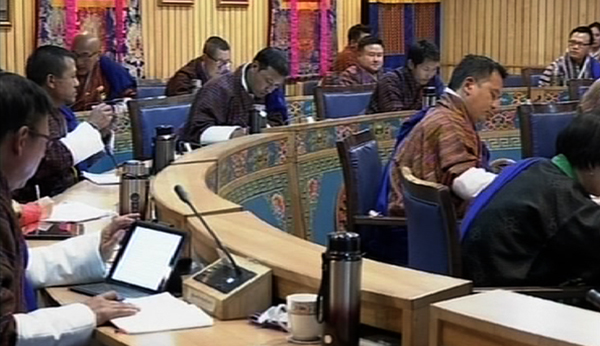 Reviewing the Renewable Natural Resources (RNR) Marketing Policy, the National Council today recommended establishing smaller capacity cold stores, improve the Agricultural Market Information System, and support the existing financial schemes related to farming. The review of the policy by the Natural Resources and Environment Committee is expected to address the challenges impeding the operation and performance of the RNR sector in terms of marketing of products.
Reviewing the Renewable Natural Resources (RNR) Marketing Policy, the National Council today recommended establishing smaller capacity cold stores, improve the Agricultural Market Information System, and support the existing financial schemes related to farming. The review of the policy by the Natural Resources and Environment Committee is expected to address the challenges impeding the operation and performance of the RNR sector in terms of marketing of products.
The opening ceremony of the National Council today saw the Natural Resources and Environment Committee presenting the review report on the RNR Marketing Policy. The Committee reported that not many Multi-Sectoral Committee meetings amongst the relevant stakeholders were held as mandated. Members of the Multi-Sectoral Committee met only once since the inception of the policy.
“The main role of the Multi-Sectoral Committee in RNR is to give support but they could only meet for once. This has affected our farmers a lot. If the Multi-Sectoral Committee cannot meet up frequently, then the job of the committee should be given to other departments,” said Lhatu, the Trashigang MP for the National Council.
It also found out that most farm shops have limited storage space, cold stores, and lack other necessary facilities. The committee also found out the absence of proper mechanism among stakeholders and Agricultural Marketing Information System unpopular and with limited information.
Accordingly, the committee recommended the Ministry of Agriculture and Forests to make the Multi-Sectoral Committee functional for better effective implementation of the RNR marketing policy.
Likewise, to improve the distribution of fresh and quality products the committee also emphasised on establishing smaller capacity cold stores and other low-cost farm level stores. It also recommended the government to continuously support the existing financial schemes with sufficient budget and good public awareness. And to have better information, the committee suggested to update the Agricultural Marketing Information System and also display it on TV screens in the market area.
Further, various members of the parliament (MP) also contributed their recommendations on the matter.
“We should not limit our markets to only two countries. Rather we should explore more markets for the benefit of our farmers. Moreover, we should also focus on developing the skills of our farmers by providing them with various training,” Surjaman Thapa, the National Council MP from Dagana.
“During the time of lockdown, our farmers had many vegetables to be sold but there was no market. Cold stores to store the leftover farm produce will be very helpful. Moreover, dehydrator machines will be also of good use to our farmers,” added Sonam Pelzom, the National Council MP of Monggar.
The RNR Marketing Policy of Bhutan was adopted in 2018 and it was to be spearheaded by the Department of Agriculture Marketing and Cooperatives under the Ministry of Agriculture and Forests.
Passang Dorji









